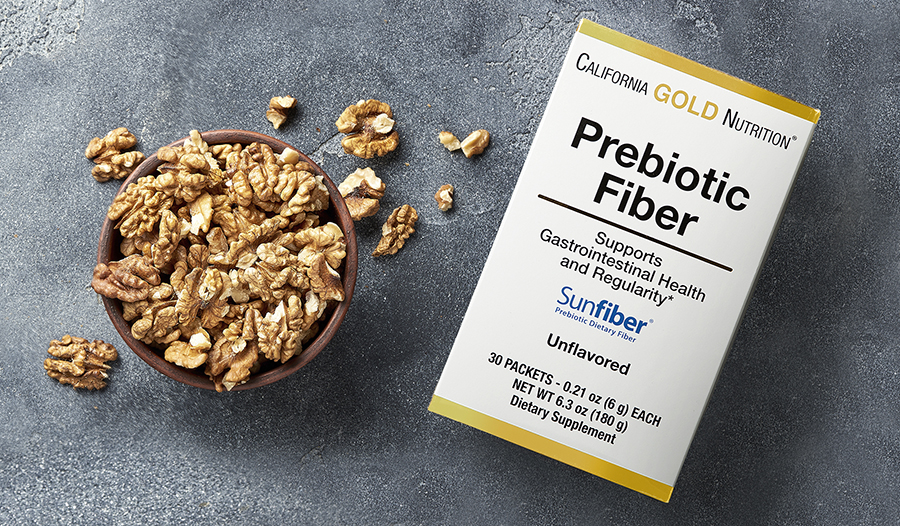This Is the Top Ingredient for Gut Health + 6 Ways to Use It
DISCLAIMER:This blog does not intend to provide diagnosis...
- In this article:
- Walnuts and Gut Health
- Health Benefits of Walnuts
- Walnuts May Be Anti-Inflammatory
- Walnuts May Support a Healthy Gut Microbiome
- Walnuts Are a Good Source of Fiber
- Tasty Ways to Enjoy Walnuts
- Takeaway

Walnuts and Gut Health
While many superfoods can help improve your gut health, this delicious ingredient is at the top of the list. There are two varieties of this nutrient-dense snack, black and English. The black type is native to Eastern North America, and the English type is native to Iran (Persia). Add them as a topping on your salad, for crunch in your cookies, or blend them in a food processor for the popular vegan meat substitute they have become famous for. No matter how you eat them, walnuts are the top ingredient you should incorporate into your diet for optimal gut health.
Health Benefits of Walnuts
Walnuts have many health benefits in addition to being a gut health powerhouse. They are rich in antioxidants and omega-3 fatty acids, both of these are important for proper cellular function. Studies also show walnuts may help you manage type 2 diabetes by lowering fasting blood sugar and hemoglobin A1C levels. Additional studies show eating walnuts may lower blood pressure in adults who are stressed or who have been diagnosed with hypertension.
Walnuts may also support brain function and healthy aging. Effects such as faster processing speeds and better memory have been linked to walnut consumption. Improved cholesterol levels have also been attributed to eating walnuts. LDLs, or bad cholesterol levels, have been shown to decrease by 5% when healthy adults consume 1.5 ounces of walnuts each day for eight weeks.
Sperm health has also been observed to show improvement with regular walnut consumption. Sperm mobility, shape, and vitality all show improvements when walnuts are a part of a man’s diet consistently.
While each of these benefits shows walnuts have exceptional health attributes, the gut health benefits make walnuts the top ingredient for gastrointestinal health and wellness.
Walnuts May Be Anti-Inflammatory
Abundant in polyphenols, walnuts can help fight inflammation in the gut. Inflammatory bowel diseases such as irritable bowel syndrome (IBS), Crohn’s disease, and ulcerative colitis are rooted in gut inflammation.
Specifically, ellagitannins, a type of polyphenol, are converted to urolithins by good bacteria in the gut. Urolithins are known to protect the gut against inflammatory processes.
Magnesium is a mineral found in walnuts. With its anti-inflammatory properties, magnesium may help soothe an inflamed bowel. Several studies found that those taking magnesium supplements showed decreased levels of C-reactive protein (CRP), an inflammatory marker in those with chronic inflammation.
The same omega-3 fatty acids that support cellular health throughout the body, also have anti-inflammatory effects on the gut. Various studies have illustrated a relationship between high omega-3 intake and reduced inflammation. Omega-3 is specifically known to decrease inflammatory molecules such as cytokines and eicosanoids. Walnuts are a rich source of Omega-3 fatty acids.
Walnuts are also rich in arginine. Scientific studies show arginine exhibits anti-inflammatory properties including reduction of inflammatory cytokine secretion.
Inflammation is the root of most all chronic illnesses, including those involving the gastrointestinal tract. Walnuts contain a plethora of micronutrients that decrease inflammation in the gut and the entire body which could lead to a reduced risk of chronic disease.
Walnuts May Support a Healthy Gut Microbiome
A gut full of good, healthy bacteria is happy and functioning better than a gut without the right bacteria flourishing. Walnuts have been shown to support healthy bacterial growth in the gut.
One study found when participants ate 1.5 ounces of walnuts daily for eight weeks, their good bacteria increased, compared to when they were not eating walnuts. A specific bacterial metabolite called butyrate was seen to increase with daily walnut consumption. Butyrate is a fat that is nourishing to your gut.
Consuming walnuts regularly to improve gut health will in turn improve your overall health. Imbalance in your gut microbiome and overgrowth of bad bacteria in the gut puts you at increased risk of obesity, IBS, small intestinal bacterial overgrowth (SIBO), autism, and heart disease.
Walnuts Are a Good Source of Fiber
A healthy gut needs everything coming in to flow out in a timely manner. Fiber is one of the primary ways we can help our guts to move things along and prevent constipation. Walnuts, along with almonds and pecans, are known to have a higher fiber content than other nuts.
Packing 5 grams of fiber in just one cup, or 2 grams in just one ounce, walnuts are a rich source of fiber needed for a healthy gut.
In addition, an ounce of walnuts offers 4 grams of protein, 18 grams of healthy fat, zero cholesterol, and 185 calories. This makes walnuts a healthy snack that is filling and nutritious. One ounce of walnuts is equivalent to about 14 walnut halves.
Tasty Ways to Enjoy Walnuts
Now that you understand the tremendous nutritional benefit walnuts have to offer, it’s time to discover 6 creative ways to enjoy your new favorite gut health superfood.
1. A Crunchy Topping
Sprinkling a handful of walnuts on a salad, oatmeal, cereal, or yogurt is a great way to enjoy the health benefits of this satisfying treat while adding texture and crunch to a simple dish. Their mild flavor makes them versatile and easy to pair with both sweet and savory foods alike.
2. Straight, No Chaser
Walnuts make for a good snack all by themselves. An ounce is a fair serving or about 14 halves. Have them as an early morning treat or a midday snack. Keep a small bag of them in your bag for when those hungry moments are tempting you to stop for an unhealthy fast-food fix. Walnuts are also handy to have on hand for any little ones who may be asking for a tasty snack on the go.
3. Baked Dessert Delight
Whether brownies, cookies, or cake, walnuts baked inside your favorite dessert can elevate a traditional treat to one with a layered crunch. Just make sure no one has a walnut allergy before sharing them at the next potluck since they can be hard to see in a baked dessert.
4. Vegan Meat Substitute
Many recipes use walnuts as a vegan meat substitute, and one favorite is vegan taco meat. You combine walnuts, baby bella mushrooms, and spices for a mixture that is quite similar to the texture and flavor of real taco meat. Enjoy this savory combo in chili, on nachos, or even make a taco salad. Soy sauce, tomato paste, olive oil, cumin, smoked paprika, garlic powder, and onion powder are the secret ingredients for a vegan taco meat everyone will love.
5. Soaked for Maximum Nutrient Absorption
Soak an ounce of walnuts in water overnight to soften them before eating. This helps the gut break them down more easily and efficiently, making it easier for your body to absorb the nutrients. Soaked walnuts are easier to digest and still taste great.
6. Superfood Smoothie
You can add them to the blender with your fruits, almond milk, ice, spinach, and protein powder, or simply grind them and sprinkle them on top of the blended smoothie. Walnuts add great nutrition to your smoothie and help to keep you feeling full, especially if your smoothie is a meal replacement. You can use fresh walnuts, but you may want to soak them in water for 10-15 minutes to soften them for easy blending. A walnut banana smoothie seems to be a popular recipe.
Takeaway
No matter how you look at it, you cannot go wrong by incorporating walnuts into your daily diet. From the health benefits to the diverse consumption methods, walnuts have something good to offer everyone.
We all should work to decrease inflammation in our bodies to lower of risk of chronic illness. Walnuts offer many pathways to lowered inflammation with a variety of anti-inflammatory micronutrients available.
A healthy gut microbiota should also be a common goal. Several studies have proven that good bacteria in the gut is critical for overall good health. Walnuts help support the growth of healthy bacteria that nourish our gut.
Most people, adults and children alike, do not eat enough fiber. Walnuts are a great source of fiber, which helps our gut motility and toxin removal process.
Whether you are looking to lower your cholesterol, blood sugar levels, or decrease your risk of heart disease and other chronic diseases, walnuts can help you achieve all these goals in a tasty and enjoyable way.
Walnuts are the perfect example of food is medicine.
References:
- Bamberger C, Rossmeier A, Lechner K, et al. A Walnut-Enriched Diet Reduces Lipids in Healthy Caucasian Subjects, Independent of Recommended Macronutrient Replacement and Time Point of Consumption: a Prospective, Randomized, Controlled Trial. Nutrients. 2017;9(10):1097. Published 2017 Oct 6. doi:10.3390/nu9101097
- Sánchez-González C, Ciudad CJ, Noé V, Izquierdo-Pulido M. Health benefits of walnut polyphenols: An exploration beyond their lipid profile. Crit Rev Food Sci Nutr. 2017;57(16):3373-3383. doi:10.1080/10408398.2015.1126218
- Simental-Mendia LE, Sahebkar A, Rodriguez-Moran M, Zambrano-Galvan G, Guerrero-Romero F. Effect of Magnesium Supplementation on Plasma C-reactive Protein Concentrations: A Systematic Review and Meta-Analysis of Randomized Controlled Trials. Curr Pharm Des. 2017;23(31):4678-4686. doi:10.2174/1381612823666170525153605
- Zhang YJ, Li S, Gan RY, Zhou T, Xu DP, Li HB. Impacts of gut bacteria on human health and diseases. Int J Mol Sci. 2015;16(4):7493-7519. Published 2015 Apr 2. doi:10.3390/ijms16047493
- Holscher HD, Guetterman HM, Swanson KS, et al. Walnut Consumption Alters the Gastrointestinal Microbiota, Microbially Derived Secondary Bile Acids, and Health Markers in Healthy Adults: A Randomized Controlled Trial. J Nutr. 2018;148(6):861-867. doi:10.1093/jn/nxy004
- Hu ED, Chen DZ, Wu JL, et al. High fiber dietary and sodium butyrate attenuate experimental autoimmune hepatitis through regulation of immune regulatory cells and intestinal barrier. Cell Immunol. 2018;328:24-32. doi:10.1016/j.cellimm.2018.03.003
- Bi D, Zhao Y, Jiang R, et al. Phytochemistry, Bioactivity and Potential Impact on Health of Juglans: the Original Plant of Walnut. Nat Prod Commun. 2016;11(6):869-880.
- Yin TP, Cai L, Chen Y, et al. Tannins and Antioxidant Activities of the Walnut (Juglans regia) Pellicle. Nat Prod Commun. 2015;10(12):2141-2144.
- Hayes D, Angove MJ, Tucci J, Dennis C. Walnuts (Juglans regia) Chemical Composition and Research in Human Health. Crit Rev Food Sci Nutr. 2016;56(8):1231-1241. doi:10.1080/10408398.2012.760516
- Farr OM, Tuccinardi D, Upadhyay J, Oussaada SM, Mantzoros CS. Walnut consumption increases activation of the insula to highly desirable food cues: A randomized, double-blind, placebo-controlled, cross-over fMRI study. Diabetes Obes Metab. 2018;20(1):173-177. doi:10.1111/dom.13060
- Zibaeenezhad M, Aghasadeghi K, Hakimi H, Yarmohammadi H, Nikaein F. The Effect of Walnut Oil Consumption on Blood Sugar in Patients With Diabetes Mellitus Type 2. Int J Endocrinol Metab. 2016;14(3):e34889. Published 2016 Jul 24. doi:10.5812/ijem.34889
- Bitok E, Jaceldo-Siegl K, Rajaram S, et al. Favourable nutrient intake and displacement with long-term walnut supplementation among elderly: results of a randomised trial. Br J Nutr. 2017;118(3):201-209. doi:10.1017/S0007114517001957
- Poulose SM, Miller MG, Shukitt-Hale B. Role of walnuts in maintaining brain health with age. J Nutr. 2014;144(4 Suppl):561S-566S. doi:10.3945/jn.113.184838
- Robbins WA, Xun L, FitzGerald LZ, Esguerra S, Henning SM, Carpenter CL. Walnuts improve semen quality in men consuming a Western-style diet: randomized control dietary intervention trial. Biol Reprod. 2012;87(4):101. Published 2012 Oct 25. doi:10.1095/biolreprod.112.101634
- West SG, Krick AL, Klein LC, et al. Effects of diets high in walnuts and flax oil on hemodynamic responses to stress and vascular endothelial function. J Am Coll Nutr. 2010;29(6):595-603. doi:10.1080/07315724.2010.10719898

 By Dr. Carlie Biggins, N.D.
By Dr. Carlie Biggins, N.D.


